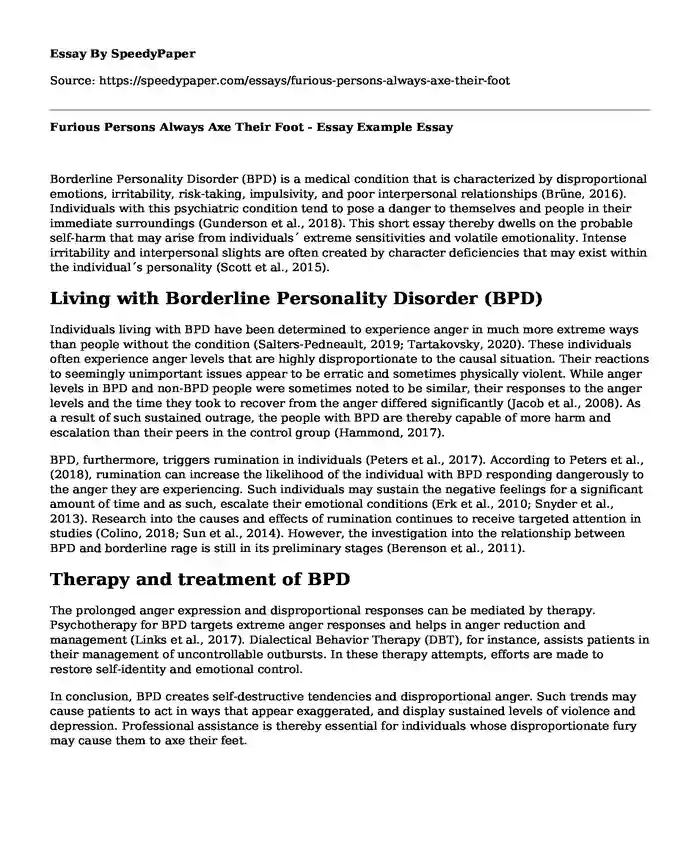
| Essay type: | Definition essays |
| Categories: | Medicine Emotional intelligence Psychological disorder Essays by pagecount |
| Pages: | 4 |
| Wordcount: | 832 words |
Borderline Personality Disorder (BPD) is a medical condition that is characterized by disproportional emotions, irritability, risk-taking, impulsivity, and poor interpersonal relationships (Brüne, 2016). Individuals with this psychiatric condition tend to pose a danger to themselves and people in their immediate surroundings (Gunderson et al., 2018). This short essay thereby dwells on the probable self-harm that may arise from individuals´ extreme sensitivities and volatile emotionality. Intense irritability and interpersonal slights are often created by character deficiencies that may exist within the individual´s personality (Scott et al., 2015).
Living with Borderline Personality Disorder (BPD)
Individuals living with BPD have been determined to experience anger in much more extreme ways than people without the condition (Salters-Pedneault, 2019; Tartakovsky, 2020). These individuals often experience anger levels that are highly disproportionate to the causal situation. Their reactions to seemingly unimportant issues appear to be erratic and sometimes physically violent. While anger levels in BPD and non-BPD people were sometimes noted to be similar, their responses to the anger levels and the time they took to recover from the anger differed significantly (Jacob et al., 2008). As a result of such sustained outrage, the people with BPD are thereby capable of more harm and escalation than their peers in the control group (Hammond, 2017).
BPD, furthermore, triggers rumination in individuals (Peters et al., 2017). According to Peters et al., (2018), rumination can increase the likelihood of the individual with BPD responding dangerously to the anger they are experiencing. Such individuals may sustain the negative feelings for a significant amount of time and as such, escalate their emotional conditions (Erk et al., 2010; Snyder et al., 2013). Research into the causes and effects of rumination continues to receive targeted attention in studies (Colino, 2018; Sun et al., 2014). However, the investigation into the relationship between BPD and borderline rage is still in its preliminary stages (Berenson et al., 2011).
Therapy and treatment of BPD
The prolonged anger expression and disproportional responses can be mediated by therapy. Psychotherapy for BPD targets extreme anger responses and helps in anger reduction and management (Links et al., 2017). Dialectical Behavior Therapy (DBT), for instance, assists patients in their management of uncontrollable outbursts. In these therapy attempts, efforts are made to restore self-identity and emotional control.
In conclusion, BPD creates self-destructive tendencies and disproportional anger. Such trends may cause patients to act in ways that appear exaggerated, and display sustained levels of violence and depression. Professional assistance is thereby essential for individuals whose disproportionate fury may cause them to axe their feet.
Bibliography
Berenson, K. R., Downey, G., Rafaeli, E., Coifman, K. G., & Paquin, N. L. (2011). The rejection–rage contingency in borderline personality disorder. Journal of Abnormal Psychology, 120(3), 681–690. https://doi.org/https://doi.org/10.1037/a0023335
Brüne, M. (2016). Borderline Personality Disorder. Evolution, Medicine, and Public Health, 2016(1), 52–66. https://doi.org/10.1093/emph/eow002
Colino, S. (2018, March 14). The Health Hazards of Rumination. U.S. News & World Report. https://health.usnews.com/wellness/mind/articles/2018-03-14/the-hazards-of-rumination-for-your-mental-and-physical-health.
Erk, S., Mikschl, A., Stier, S., Ciaramidaro, A., Gapp, V., Weber, B., & Walter, H. (2010). Acute and Sustained Effects of Cognitive Emotion Regulation in Major Depression. Journal of Neuroscience, 30(47), 15726–15734. https://doi.org/10.1523/jneurosci.1856-10.2010
Gunderson, J. G., Herpertz, S. C., Skodol, A. E., Torgersen, S., & Zanarini, M. C. (2018). Borderline personality disorder. Nature Reviews Disease Primers, 4(1). https://doi.org/10.1038/nrdp.2018.29
Hammond, C. (2017, July 11). A Borderline's Emotional Reaction Cycle. Psych Central. https://pro.psychcentral.com/exhausted-woman/2017/01/a-borderlines-emotional-reaction-cycle/.
Jacob, G. A., Guenzler, C., Zimmermann, S., Scheel, C. N., Rüsch, N., Leonhart, R., … Lieb, K. (2008). Time course of anger and other emotions in women with borderline personality disorder: A preliminary study. Journal of Behavior Therapy and Experimental Psychiatry, 39(3), 391–402. https://doi.org/https://doi.org/10.1016/j.jbtep.2007.10.009
Links, P. S., Shah, R., & Eynan, R. (2017). Psychotherapy for Borderline Personality Disorder: Progress and Remaining Challenges. Current Psychiatry Reports, 19(3). https://doi.org/10.1007/s11920-017-0766-x
Peters, J. R., Chester, D. S., Walsh, E. C., Dewall, C. N., & Baer, R. A. (2018). The rewarding nature of provocation-focused rumination in women with borderline personality disorder: a preliminary fMRI investigation. Borderline Personality Disorder and Emotion Dysregulation, 5(1). https://doi.org/10.1186/s40479-018-0079-7
Peters, J. R., Eisenlohr-Moul, T. A., Upton, B. T., Talavera, N. A., Folsom, J. J., & Baer, R. A. (2017). Characteristics of Repetitive Thought Associated with Borderline Personality Features: A Multimodal Investigation of Ruminative Content and Style. Journal of Psychopathology and Behavioral Assessment, 39(3), 456–466. https://doi.org/10.1007/s10862-017-9594-x
Salters-Pedneault, K. (2019, August 16). The Link Between Anger and BPD. Verywell Mind. https://www.verywellmind.com/understanding-borderline-anger-425480.
Scott, L. N., Stepp, S. D., Hallquist, M. N., Whalen, D. J., Wright, A. G. C., & Pilkonis, P. A. (2015). Daily shame and hostile irritability in adolescent girls with borderline personality disorder symptoms. Personality Disorders: Theory, Research, and Treatment, 6(1), 53–63. https://doi.org/https://doi.org/10.1037/per0000107
Snyder, S. A., Heller, S. M., Lumian, D. S., & Mcrae, K. (2013). Regulation of positive and negative emotion: effects of sociocultural context. Frontiers in Psychology, 4. https://doi.org/https://doi.org/10.3389/fpsyg.2013.00259
Sun, H., Tan, Q., Fan, G., & Tsui, Q. (2014). Different effects of rumination on depression: key role of hope. International Journal of Mental Health Systems, 8(1), 1–5. https://doi.org/https://doi.org/10.1186/1752-4458-8-53
Tartakovsky, M. (2020, January 14). Living with Borderline Personality Disorder. Psych Central. https://psychcentral.com/disorders/borderline-personality-disorder/living-with/.
Cite this page
Furious Persons Always Axe Their Foot - Essay Example. (2023, Aug 16). Retrieved from https://speedypaper.com/essays/furious-persons-always-axe-their-foot
Request Removal
If you are the original author of this essay and no longer wish to have it published on the SpeedyPaper website, please click below to request its removal:
- Essay Sample on Why Black Neo-Conservatives Matter
- Free Essay about the Effects of Domestic Violence on Nurses
- Free Essay on Corporate Governance and Its Effects on the Corruption Rate in Saudi Arabia
- Texting While Driving - Free Essay with a Reply to a Paper
- Essay Sample on Health Care Funding in United States of America
- Paper Example on Implementation of an Act
- Free Essay Example: Christian and Pagan Elements in Beowulf
Popular categories




